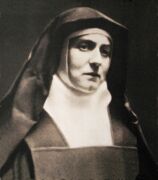- Home
- About Us
- Our Houses
- Stein
Stein

St Edith Stein (Teresa Benedicta of the Cross) (1891 – 1942)
Equality, Faith and Education
“Do not accept anything as the truth if it lacks love.
And do not accept anything as love if it lacks truth.”
The students of St Gregory’s were keen for St Edith Stein to be one of our house saints due to her tenacious appetite for answers and meaning to life, as well as her challenging journey of faith and eagerness for equality. Each of our house saints has a trio of values that summarise who they were and the witness they give to us. For St Edith Stein, Education, Equality & Faith truly captured the essence of who she was and what we can learn from her.
Edith’s father died when she was only 2 years old and she was the youngest of 11 children. In order for the family to survive, her mum had to take over the family lumber business whilst raising 11 children!
As a teenager she was strong minded and had the courage of her convictions. She was intelligent and did well at school. For Edith education was about all parts of life. Teachers had to practice what they preached and had to show it in action in order for there to be worth. As she once said, “The entire education process must be carried out with love.” It was because of this that she lost all faith and became an atheist at the age of 14, witnessing the hypocrisy of her Jewish peers not putting words into action.
It is the next part of her life that is particularly relevant to our young people as they journey through education. A few years later she sought out with huge conviction studying under a great academic of the time who taught Phenomenology. Phenomenology can be described as:
A philosophy of experience. It is the ultimate source of all meaning and value is the lived experience of human beings.
St Edith Stein has the most extraordinary thirst and eagerness to understand what it means to be human and what is important. It was through this study that she was brought back to faith and eventually decided that her vocation was to teach.
As a member of Stein house, I am proud to follow in her footsteps. As a youngster she wasn’t sure where she belonged, but she was able to find her place in life standing up for women and equality. I want to be brave like her and find what it is that I love doing the most.
- Eden, Year 7
With the backdrop of Hitler and Fascism gaining power and momentum in Germany, she persisted in pushing for her right to teach and championed her vocation and ability to be a female academic in a male dominated workplace. She fought tooth and nail to show that as a young girl, and then as a woman, she was as blessed with intellect and had so much to give to the world. She once said, “There is no profession which cannot be practiced by a woman”. For the first time children and young adults were able to see in practice that women were just as educated and capable as men.
It was once she was a young adult and picked up the autobiography of another strong independent Catholic woman, St Teresa of Avila, that she truly found meaning in life. Vocation is key to her story of faith. She wanted to enter the convent much earlier than she did, but she was advised to ‘stay in the world longer’ to witness to the truth. It was at this point that her faith was shared with so many young girls, and when she was able to put her great intellect to good use by translating works of great Philosophers, Thomas Aquinas and the works of John Henry Newman.
Being born a Jew, she eventually fell victim to the Nazi persecution, who targeted those who converted too. She was sent to Auschwitz alongside her sister and was killed.
Throughout her life she remained strong minded, courageous and truthful. As an early feminist and a person of faith, she truly understood the idea of vocation and that each of us can fulfil our own vocation regardless of gender.